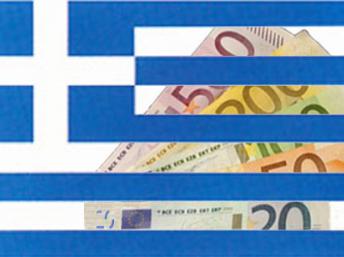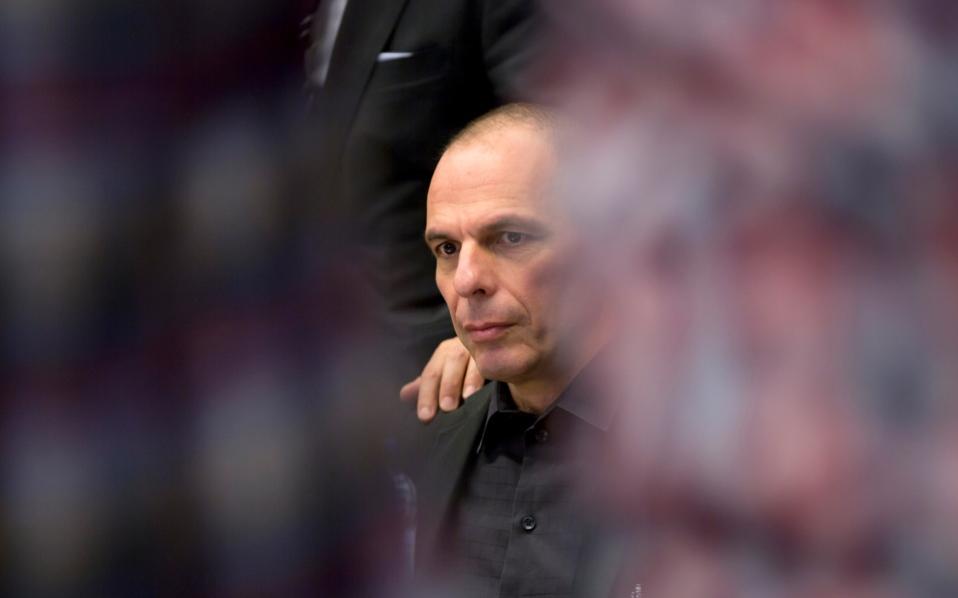Greece: Varoufakis Claims He Had Approval To Plan A “Parallel Banking System”

Former Finance Minister Yanis Varoufakis has claimed that he was authorized by Alexis Tsipras last December to look into a parallel payment system that would operate using wiretapped tax registration numbers (AFMs) and could eventually work as a parallel banking system, Kathimerini has learned.
In a teleconference call with members of international hedge funds that was allegedly coordinated by former British Chancellor of the Exchequer Norman Lamont, Varoufakis claimed to have been given the okay by Tsipras last December – a month before general elections that brought SYRIZA to power – to plan a payment system that could operate in euros but which could be changed into drachmas “overnight” if necessary, Kathimerini understands.
Varoufakis worked with a small team to prepare the plan, which would have required a staff of 1,000 to implement but did not get the final go-ahead from Tsipras to proceed, he said.
The call took place on July 16, more than a week after Varoufakis left his post as finance minister.

The plan would involve hijacking the AFMs of taxpayers and corporations by hacking into General Secretariat of Public Revenues website, Varoufakis told his interlocutors. This would allow the creation of a parallel system that could operate if banks were forced to close and which would allow payments to be made between third parties and the state and could eventually lead to the creation of a parallel banking system, he said.
As the general secretariat is a system that is monitored by Greece’s creditors and is therefore difficult to access, Varoufakis said he assigned a childhood friend of his, an information technology expert who became a professor at Columbia University, to hack into the system. A week after Varouakis took over the ministry, he said the friend telephoned him and said he had “control” of the hardware but not the software “which belongs to the troika.”
Recorded call
You can find extracts from the conversation below. Varoufakis was advised that the call was being recorded when it began.
Varoufakis: “I have to admit we did not have a mandate for bringing Greece out of the euro. What we had was a mandate to negotiate for a kind of arrangement with the Eurogroup and the ECB that would render Greece sustainable within the eurozone. The mandate went a bit further, at least in my estimation. I think the Greek people had authorised us to pursue energetically and vigorously that negotiation to the point of saying that if we can’t have a viable agreement, then we should consider getting out.”
“We don’t have a currency which we can devalue vis a vis the euro, we have the euro”
“[Wolfgang] Schaeuble, the finance minister of Germany, is hell-bent on effecting a Grexit so nothing is over. But let me be very specific and very precise on this. The prime minister before he became PM, before we won the election in January, had given me the green light to come up with a Plan B. And I assembled a very able team, a small team as it had to be because that had to be kept completely under wraps for obvious reasons. And we had been working since the end of December or beginning of January on creating one. But let me give you if you are interested some of the political and the institutional impediments that made it hard for us to complete the work and indeed to activate it. The work was more or less complete: We did have a Plan B but the difficulty was to go from the five people who were planning it to the 1,000 people that would have to implement it. For that I would have to receive another authorisation which never came.”
“But let me give you an example. We were planning along a number fronts. I will just mention one. Take the case of the first few moments when the banks are shut, the ATMs don’t function and there has to be some parallel payment system by which to keep the economy going for a little while, to give the population the feel that the state is in control and that there is a plan.”
“What we planned to do was the following. There is the website of the tax office like there is in Britain and everywhere else, where citizens, taxpayers go into the website they use their tax file number and they transfer through web banking monies from the bank account to their tax file number so as to make payments on VAT, income tax and so on and so forth.”
“We were planning to create, surreptitiously, reserve accounts attached to every tax file number, without telling anyone, just to have this system in a function under wraps. And, at the touch of a button, to allow us to give PIN numbers to tax file number holders, to taxpayers. So let’s take for instance the case the state owed 1 million euros to some pharmaceutical company for drugs purchased on behalf of the National Health Service. We could immediately create a digital transfer into that reserve account of the tax file number of the pharmaceutical company and provide them with a pin number so that they could use this as a kind of parallel payment mechanism by whichever part of that digital monies to any tax file number for whom they owed money or indeed to use it to in order to make tax payments to the state. That would have created a parallel banking system while the banks were shut as a result of the ECBs aggressive action to deny us some breathing space.”
“This was very well developed and I think it would have made a very big difference because very soon we could have extended it, using apps on smartphones and it could become a functioning parallel system and of course this would be euro denominated but at the drop of a hat it could be converted to a new drachma.”
“But let me tell you – and this is quite a fascinating story – what difficulties I faced. The General Secretary of Public Revenues within my ministry is controlled fully and directly by the troika. It was not under control of my ministry, of me as minister, it was controlled by Brussels. The general secretary is appointed effectively through a process which is troika-controlled and the whole mechanism within. It’s like the Inland Revenue in the UK being controlled by Brussels. I am sure as you are hearing these words your hair is standing on end.”
“Ok, so problem number one: The general secretary of information systems on the other hand was controlled by me, as minister. I appointed a good friend of mine, a childhood friend of mine who had become professor of IT at Columbia University in the States and so on. I put him in because I trusted him to develop this.”
“At some point, a week or so after we moved into the ministry, he calls me up and says to me: “You know what? I control the machines, I control the hardware but I do not control the software. The software belongs to the troika controlled General Secretary of Public Revenues. What do I do?””
“So we had meeting just two of us – nobody else knew – and he said: “Listen, if I ask for permission from them to start implementing this program then the troika will immediately know we are designing a parallel system.” But I said: “That won’t do, we don’t want to reveal our hand at this stage.””
“So I authorised him – and you can’t tell anyone that, this is totally between us…”
Normal Lamont interrupts: “There are certainly others listening but they will not tell it to their friends.”
Varoufakis (laughing): “I know. I know they are. And even if they do I will deny I said it, so we decided to hack into my ministry’s own software program in order to be able break it up to just copy just to copy the code of the tax systems website onto a large computer in his office so that he can work out how to design and implement this parallel payment system.”
“And we were ready to get the green light from the PM when the banks closed in order to move into the General Secretariat of Public Revenues, which is not controlled by us but is controlled by Brussels, and to plug this laptop in and to energize the system.”
“So I am trying to convey to you the kind of institutional problems that we had, institutional impediments we had to carrying out an independent policy for ameliorating the effects of having our banks being closed down by the ECB.”
On Schaeuble
“Schaeuble has a plan. The way he described it to me is very simple. He believes that the eurozone is not sustainable as it is. He believes there has to be some fiscal transfers, some degree of political union. He believes that for that political union to work without federation, without the legitimacy that a properly elected federal parliament can render, can bestow upon an executive, it will have to be done in a very disciplinary way. And he said explicitly to me that a Grexit is going to equip him with sufficient bargaining, sufficient terrorising power in order to impose upon the French that which Paris has been resisting. And what is that? A degree of transfer of budget making powers from Paris to Brussels.”

